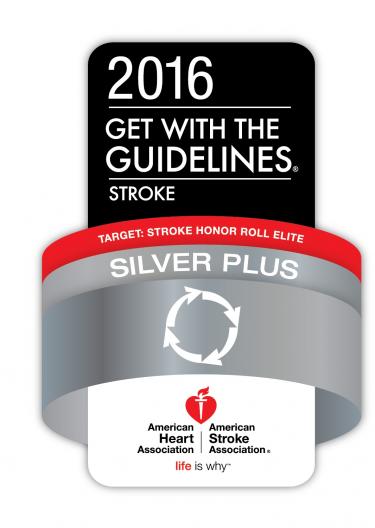




Awards and Achievements
Methodist Hospital 1st in Omaha to Achieve AHA Target Stroke Honor Roll Elite Status
Published: June 2, 2016
The American Heart Association/American Stroke Association has awarded its Target Stroke Honor Roll Elite designation to Methodist Hospital, recognizing Methodist Hospital as the first hospital in the city of Omaha to achieve this designation.
Methodist also earned the Get With The Guidelines®-Stroke Silver Plus Quality Achievement Award.
The awards were presented at a special ceremony held June 1.
Target Stroke Honor Roll Elite Designation
The awards were presented by Beth Malina, American Heart Association/American Stroke Association director of quality and system improvement for Nebraska, Kansas and the Kansas City metropolitan area.
“Earning the Target Stroke Honor Roll Elite award is a significant achievement for Methodist,” Malina said. “They have worked diligently to assure that every patient that comes here is getting consistent care. Patients that are arriving at Methodist are being quickly assessed and getting the stroke drug accordingly. We always say ‘time is brain.’ The quicker the patients get the medication, the better the outcome.”
To qualify for the Target: Stroke Honor Roll Elite, hospitals must meet quality measures developed to reduce the time between the patient’s arrival at the hospital and treatment with the clot-buster tissue plasminogen activator, or tPA, the only drug approved by the U.S. Food and Drug Administration to treat ischemic stroke. The drug therapy must be administered within 60 minutes in at least 75 percent of patients. If given intravenously in the first three hours after the start of stroke symptoms, tPA has been shown to significantly reduce the effects of stroke and lessen the chance of permanent disability.
Get With The Guidelines®-Stroke Silver Plus Quality Achievement Award
To receive the Silver Plus Quality Achievement Award, hospitals must achieve 85 percent or higher adherence to all Get With The Guidelines-Stroke achievement indicators for at least 12 consecutive months, and during the same period achieve 75 percent or higher compliance with five of eight Get With The Guidelines-Stroke Quality measures.
These quality measures are designed to help hospital teams follow the most up-to-date, evidence-based guidelines with the goal of speeding recovery and reducing death and disability for stroke patients.
Methodist Hospital Stroke Program Coordinator Pam Stout said, "A stroke patient loses 1.9 million neurons each minute stroke treatment is delayed. Today’s recognition further demonstrates our commitment to delivering advanced stroke treatments to patients quickly and safely. Methodist continues to strive for excellence in the acute treatment of stroke patients. The recognition from the American Heart Association/American Stroke Association’s Get With The Guidelines-Stroke further reinforces our team’s hard work.”
Methodist Hospital: A Certified Primary Stroke Center
Methodist has also met specific scientific guidelines as a Primary Stroke Center, achieving recertification in March. As a Primary Stroke Center, Methodist has a comprehensive system for rapid diagnosis and treatment of stroke patients admitted to the emergency department. Methodist Hospital treated nearly 400 stroke patients in 2015.
“The American Heart Association and American Stroke Association recognizes Methodist Hospital for its commitment to stroke care,” said Paul Heidenreich, MD, MS, national chairman of the Get With The Guidelines Steering Committee and professor of medicine at Stanford University. “Research has shown there are benefits to patients who are treated at hospitals that have adopted the Get With The Guidelines program.”
According to the American Heart Association/American Stroke Association, stroke is the No. 5 cause of death and a leading cause of adult disability in the United States. On average, someone in the U.S. suffers a stroke every 40 seconds, someone dies of a stroke every four minutes, and nearly 800,000 people suffer a new or recurrent stroke each year.
